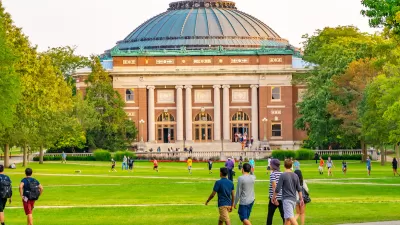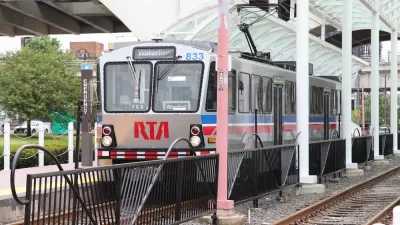Most college campuses in the United States are inherently walkable, mixing various uses with diverse housing options and transit networks.

In an article for the University of Washington’ The Daily, Nicole McMillan highlights how college campuses mirror the qualities that many urbanists value most in communities: mixed use, walkability, access to transit, and dense housing. Unfortunately, McMillan writes, “For many people, college is the first and only time they live within a walkable community.”
McMillan outlines the—to urbanists—well-known history of car dependence, massive highway projects, and urban renewal in the United States, as well as the unique qualities of college life that make campuses ideal social communities.
For McMillan, this points to the fact that “When areas prioritize pedestrians in their infrastructure, the result is a happier and healthier population.” Campuses also offer a higher-than-average number of ‘third places,’ the spaces between home and school or work that allow people to relax, meet, socialize, and have random interactions.
To maintain the communal college atmosphere after graduation, McMillan recommends continuing to seek out your own third places, those where you’ll meet people who challenge your existing perspectives and help you grow.
FULL STORY: Escaping the suburban sprawl: what college campuses teach us about walkable communities

Alabama: Trump Terminates Settlements for Black Communities Harmed By Raw Sewage
Trump deemed the landmark civil rights agreement “illegal DEI and environmental justice policy.”

Study: Maui’s Plan to Convert Vacation Rentals to Long-Term Housing Could Cause Nearly $1 Billion Economic Loss
The plan would reduce visitor accommodation by 25% resulting in 1,900 jobs lost.

Why Should We Subsidize Public Transportation?
Many public transit agencies face financial stress due to rising costs, declining fare revenue, and declining subsidies. Transit advocates must provide a strong business case for increasing public transit funding.

Wind Energy on the Rise Despite Federal Policy Reversal
The Trump administration is revoking federal support for renewable energy, but demand for new projects continues unabated.

Passengers Flock to Caltrain After Electrification
The new electric trains are running faster and more reliably, leading to strong ridership growth on the Bay Area rail system.

Texas Churches Rally Behind ‘Yes in God’s Back Yard’ Legislation
Religious leaders want the state to reduce zoning regulations to streamline leasing church-owned land to housing developers.
Urban Design for Planners 1: Software Tools
This six-course series explores essential urban design concepts using open source software and equips planners with the tools they need to participate fully in the urban design process.
Planning for Universal Design
Learn the tools for implementing Universal Design in planning regulations.
Caltrans
Smith Gee Studio
Institute for Housing and Urban Development Studies (IHS)
City of Grandview
Harvard GSD Executive Education
Toledo-Lucas County Plan Commissions
Salt Lake City
NYU Wagner Graduate School of Public Service





























